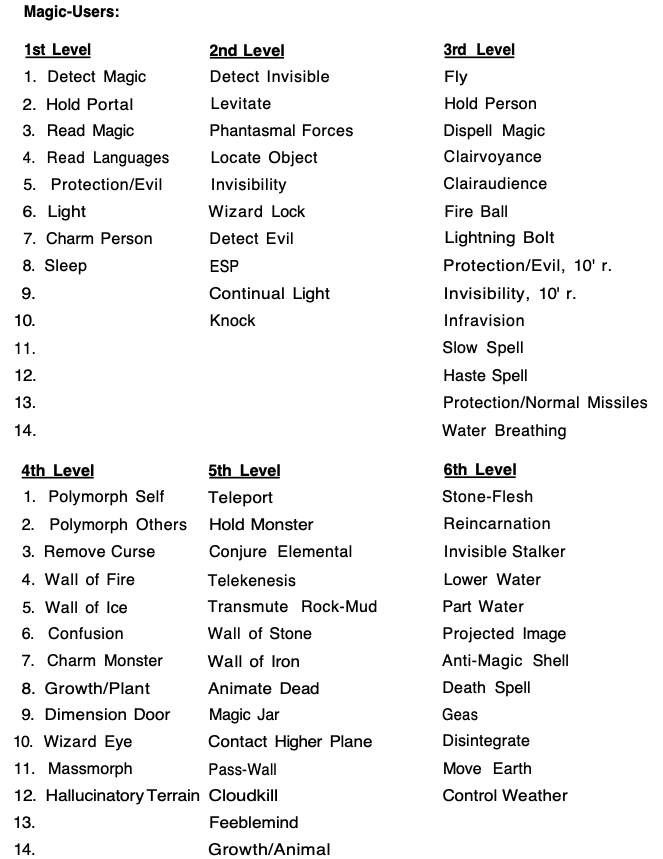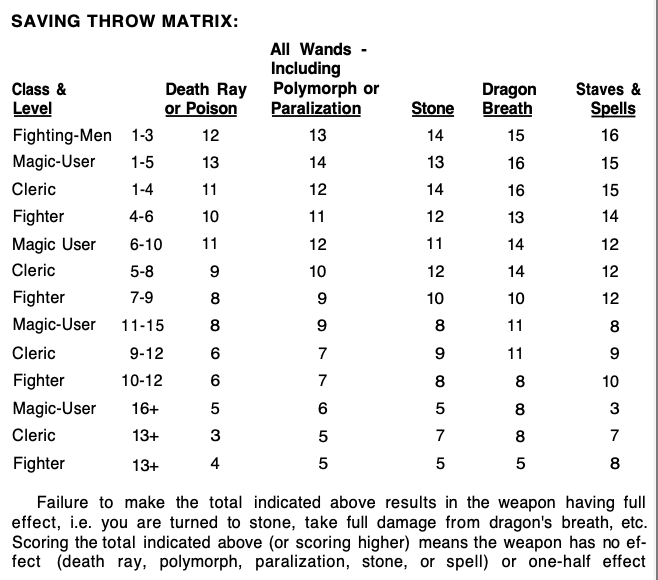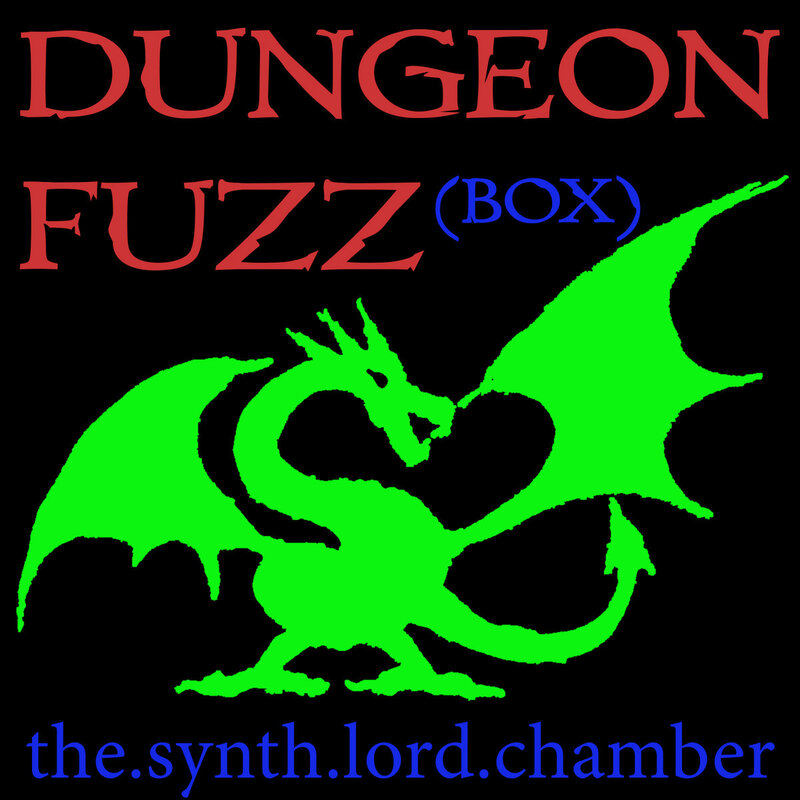|
Much as I love RPGs, and especially the old ones, with few exceptions the rules for magic and spell casting leave a lot to be desired. If you are not familiar with Original D&D, you can take a look at the original Basic D&D by Holmes here: www.americanroads.us/DandD/DnD_Basic_Rules_Holmes.pdf Gonna go out on a limb and claim that SJGames, The Fantasy Trip: Wizard may be the only well functioning magic system I've ever played. It derives ideas from Tunnels and Trolls, which is much more interesting when it comes to magic spells than D&D, except the spell names are a bit goofy in T and T. The Fantasy Trip is a light weight Path Finder style game with simple elegant design features. If you are into home brewing and haven’t played either, I highly advise you get a copy of both. TFT: WIZARD - https://warehouse23.com/products/the-fantasy-trip-wizard TUNNELS AND TROLLS - https://www.drivethrurpg.com/product/108306/Tunnels--Trolls-Rules-4th-Edition Within the original style of games most gamers are coming at Fantasy Role Playing, or FRP, from a literary perspective. i.e. Most of these gamers who play Old School grew up also reading a variety of fantasy novels which had a huge impact on the collective ideas for setting and power levels for player characters. Consider, most early games tend to be low magic. Sure, you can find magical artifacts and you can cast spells, but you will need more than magic to solve most situations you run into. Thus, what I am talking about today may not apply at all to anything published later than about 1997 when WOTC acquired all the assets of TSR including the D&D trade name. Original D&D was comprised of 3 little booklets. Each being around 66 pages long. It had enough in those booklets to inspire any group of gamers to create entire worlds. Some of these worlds are still being explored today still using the most simple of rules. Yet, the simplicity of the system left many desiring to expand the game system. The end result often has problems, most notable of these problems being that complexity and supposed increased realism, makes the games play slowly. *Cough Cough* (Path Finder) To add onto the pile of garbage that Original D&D is (Yes, I love it, but I can see what a pile of garbage the rules are.), original D&D introduced another magic type system called Psionics. I’ve made up characters and tried testing the psionic rules for both OD&D and AD&D. I found them a bit over powered. I can’t really wrap my own mind around the concept of having a world setting with ordinary magic and psionic power. For me, it breaks setting to have both as they are both magic. I feel they need to be merged together. Thus some of the ideas for things like psionic mental attacks could be shoved back into the regular magic realm as spells. Lately I have been fiddling my game system some more. I have pondered how to keep the game simple, yet, add more flavor to the game's magic spells. Like all my other modifications I am fine with publishing rough ideas that may not work. If you dig through this blog you can find rules for spell points in OD&D, as well as rules for weapon damage based on size comparison. Neither of the articles presents a fully playable set of rules. I am just throwing out some ideas. You can take those concepts and run with them and do your own thing. If you publish based on my ideas a citation would be nice though. I always try to cite other people who had interesting ideas that I riffed on. In OD&D spells are just simple gotchas that always work. Although they tried to fix some problems by creating a hierarchy for some kinds of spells it just leaves a bit to be desired. Many of the spells seem either under powered or over powered. As my own campaign moves into a more refined state I am seeking simple home rules to upgrade with. Simplicity is key. We have several game systems being developed in our house group and one thing that happens in the beta test first round is how obviously over ruled our games are. We keep having to chop all of them down and remove die rolls and actions to stream line play. Let’s talk about the sensing and control spells. Detect Evil and Charm Person are a perfect example of spells which could use a bit more definition as well as a bit of refining as Charm is way too powerful. And then we get the spells such as E.S.P. which really seem like extensions of the two previous spells. All of these spells have to do with behavior that is a lot like Psionics. I would add that D&D Psionics really feel more like something to be used in sci fi games, I’ll leave that for you to ponder. I see these spells as easily categorized like so: 1. Feeling/sensing consciousness as a pre-lingual experience for a caster “You sense that a malevolent being is nearby.” 2. Reading/Listening as an ability to understand another’s verbal thoughts, or perhaps to see through the subject’s eyes and ears. 3. Telepathic conversation which could be sending a message and or even allowing for two way conversation. 4. Psychic control or compulsion as per Charm, or perhaps even Geas. (Should charm be two spells, one is an influence on reactions and the other is full on mental control.) 5. Psychic attack as in a kind of mental battle that can cause unconsciousness and or death. Each of these grades of power has both an active and passive form. It makes sense that if you can cast one of these spells, then you also know the passive/defensive version of the spell. (This is discussed in OD&D if I recall correctly.) Thus a Magic user might cast a spell to mask feeling and sensing during a secret raid on an evil wizard or priests domain. And, a wizard might cast one of these on a party member to keep them from being attacked or controlled by an enemy during a battle. If you play in the old way, Character Attributes are best viewed as potential whereas class level is actual training and ability. In a game this can get a bit blurred as some things about human beings, real human beings, seem more innate than actual trained ability. Success or failure with these spells should not be a binary die roll as in a combat attack. A player should never be too sure how successful they are. For sensing you may want to do a combined mechanic of both range and level of caster. Thus a player could get 1d6 X 10 feet per 3 levels of ability. As a Referee I might be a bit fast and loose with results and a creature sensed just outside of range might lead to telling the player “You feel there is something angry, but the feeling is very feint.” I prefer to simplify my games, thus if a M.U. casts the passive, or defensive, version of mental sensing it just works. Enemies won’t know you are there. This is the thing about magic spells. Most game descriptions are vague and they often act as a ‘anything in range’ kind of spell. I often feel like the specific situation requires a referee judgement to interpret what a result is with players not knowing the full picture ever. I understand if some referees and players find this fog of war approach too chaotic. Yet, the fog of war approach is how you create a truly mystical experience for players during a game. As you move to more difficult spells in their active and more invasive forms you may want to use some modified simple die rolls. We need to know if the subject notices they are being mind read, or if they are able to defend against being controlled, or attacked. This is where I feel every RPG since OD&D gets it wrong. The beauty of OD&D/Holmes Basic D&D is in the simplicity. It’s possible to clear half a one page dungeon level in one session. Consider how you want to mechanize these spells. If a challenge is required, do you simply use the saving throw chart? Maybe a M.u. can only control a quantity of hit dice equal to their own level, thus a 1st level wizard can’t go around charming higher level players. Maybe you do a mutual challenge roll with modifiers based on class and level? Perhaps the caster and the defender each roll a D6 with the higher number winning. All ties mean the subject is aware someone is psychically attacking them. Certainly the psychic attack needs to be a 6th level spell. Maybe for this one each player rolls a d20 and the caster has to exceed the defenders die roll by 5 to succeed in knocking the subject out, and by 10 to outright kill them. What kind of mods would you have? Barbarians might be more vulnerable to this kind of attach than other classes. I know a lot of you want some kind of strict guide for your rules. I am still testing these ideas, thus I am merely tossing this out there for you to consider as a home rule in your own game. Let me know if you try this out and how you decided to rule each of the spells as they are all quite different and may require a different rule for how they work. Help Fund our Ongoing Research ProjectCheck out our STORE here: https://www.tfott.com/category/all-products
You can also purchase Dark Ambient music to play during your game sessions here: https://thesynthlordchamber.bandcamp.com/album/dungeon-fuzz-box Thank you for taking the time to read, Griff
0 Comments
|
DVD'S, Books, T-shirts, games and more available on our store.
AuthorSecrets of Blackmoor is a Feature-length documentary about the birth of the “Mother of all Games;” Dungeons & Dragons. Archives
January 2024
Categories |
Privacy Policy
All Contents Copyright © 2023 The Fellowship of the Thing, Ltd. - All Rights Reserved
All Contents Copyright © 2023 The Fellowship of the Thing, Ltd. - All Rights Reserved






 RSS Feed
RSS Feed